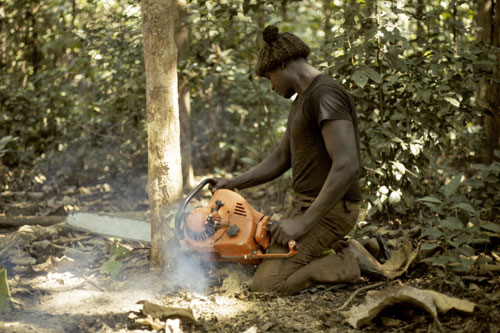UN food agency calls for measures to preserve natural teak forests
The United Nations food agency today called for implementing measures to preserve natural teak forests, which are currently in decline, and improve management practices of planted teak forests, to sustain the supply and quality of the wood extracted from this natural resource.

Cutting trees at a teak plantation in the Casamance Forests in Zingenchor, Senegal.
Natural teak forests teak forests grow in only four countries: India, Laos, Myanmar and Thailand. According to an assessment carried out by the Food and Agriculture Organization (FAO), except for Thailand, the countries have registered a significant decline in teak forest hectares, as well as deterioration in the quality of teak wood – one of the most valuable hardwoods in the world.
Between 1992 and 2010, Laos lost 68,500 hectares of teak forests, India 2.1 million hectares, and Myanmar 1.1 million hectares. Thailand’s complete ban on logging in natural forests introduced in 1989, the report suggests, may have contributed to the recovery of natural teak forests, which increased by 2.9 million hectares during the same time period.
An FAO Forestry Officer, Walter Kollert, stressed that production of teak logs from natural forests will be further limited due to continuing deforestation and competition for environmental services, making it vital to put measures in place to preserve them.
“Supply trend points to a continuing decline in the volume and quality of natural teak, which results in progressive loss of genetic resources,” Mr. Kollet said. “This is why it is essential in the near future to plan, organize and implement a programme for the genetic conservation of native teak resources in the four countries with natural teak forests.”
The assessment, which was conducted in 60 tropical countries, found an opposite trend in planted teak forests. Its findings suggest that these are increasing globally, with African, Asian and Latin American private sectors heavily investing in teak to obtain hardwood.
“Although the time until trees reach harvestable dimensions is comparatively long and on average takes between 20 and 80 years, teak planting serves local communities as a savings account and in the long run helps smallholders improve their livelihoods and the livelihoods of their children,” Mr. Kollert said.
Currently, Asia holds more than 90 per cent of teak resources worldwide, with India managing 39 per cent of the world’s planted teak forests. Eleven out of 14 reporting countries named India as their number one importer, absorbing 70 to 100 per cent of global teak exports. The report added that Myanmar, India and Indonesia, are also expected to maintain their position in the market as sources of premium quality teak, but the supply may be limited in the future.
Source: UN NEWS
- 462 reads
Human Rights
Ringing FOWPAL’s Peace Bell for the World:Nobel Peace Prize Laureates’ Visions and Actions

Protecting the World’s Cultural Diversity for a Sustainable Future

The Peace Bell Resonates at the 27th Eurasian Economic Summit

Declaration of World Day of the Power of Hope Endorsed by People in 158 Nations

Puppet Show I International Friendship Day 2020

